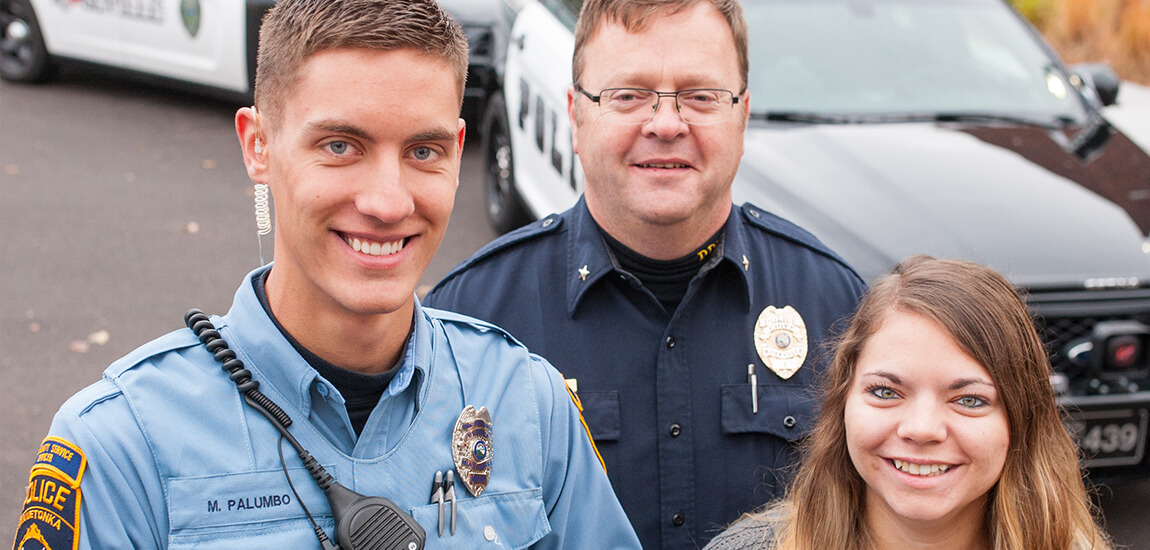A criminal justice degree builds on a foundation of psychology and practical knowledge of law enforcement. You will examine the policies, principles, and social dynamics that shape the system of law. You will be prepared with the foundation for further graduate study in law or social work.
Criminal justice may be the right degree for you if you
- have a passion for serving the public
- desire to understand the minds of criminals
- want a career working in law enforcement
- have an interest in law
Why study criminal justice at Northwestern?
At Northwestern, you’ll approach law enforcement and criminal justice with a heart of ministry. Our small classes allow our faculty to encourage you to grow in your faith while you minister to others.
You can choose from two different tracks: General Criminal Justice or Law Enforcement. Northwestern’s law enforcement track is POST-certified (Police Officer Standards and Training). Northwestern is one of 29 schools in the state of Minnesota that offers this certification. After you complete your coursework through Northwestern, you will be approved for the academic component of the Professional Peace Officer Education (PPOE). Students will still be required to complete the skills component with an outside agency after graduating.
Our criminal justice professors are former or current practitioners. They will help you build professional contacts and explore areas of interest. Through a required internship class, you’ll collaborate with federal, state, county, and local agencies to provide hands-on training and experience.
Past internships include Minneapolis Police Department, Roseville Police Department, St. Paul Police Department, Juvenile Detention Center, St. Paul, Anoka County Juvenile Probation, Ramsey County Sheriff’s Office, United States Postal Investigation Service, Hennepin County Adult Field Services/Family Court Services, Metro Police Departments, Alexandra House working with victims of domestic violence, and Immigration and Customs Enforcement.
Request Information
Careers in criminal justice
There are a variety of career and academic pathways that begin with a degree in criminal justice.
What types of work are related to this degree?
- Corrections, probation, parole
- Juvenile justice
- Victim’s assistance or advocacy
- Social work (often requires additional training)
- Prevention services
- Court appointed guardian ad litem or advocate
- Private security and investigations
- Surveillance or intelligence
- Police work (often requires additional training)
- Attorney (often requires additional training)
- Investigator
What will I learn?
You will learn to analyze and develop critical thinking skills and an appreciation for the law.
CRJ 4327
Criminal Law
An examination of the sociology of law, definitions of criminal behavior and defenses to criminal prosecution. Special attention is given to substantive law and to procedural law, such as constitutional issues surrounding arrest through incarceration.
CRJ 3228
Deviance
An examination of the etiology of criminal behavior, with an emphasis on addictions and chemical abuse and how these relate to rehabilitation versus social control. Attention is also given to ways in which social inequality contributes to criminal behavior and its impact on the criminal justice system.
PSY 2108
Lifespan Psychology
A study of the nature and implications of development from conception through death. Emphasis is upon cognitive, moral, spiritual, emotional, interpersonal, and self-development. Topics to be addressed include stages of development from birth through adolescence; maturation during the college years; critical periods of adulthood; marriage, and parenting; ageism and physiological processes of aging; death and dying.
PSY 3207
Abnormal Psychology
An examination of the multidimensional determinants which influence the development of psychopathology. Students will explore assessment, diagnosis, and the conceptualization of disorders as defined by the Diagnostic Statistical Manual classification system. An exploration of etiology, diagnostic considerations, and cultural factors will be emphasized. Clinical and scientific research will be examined to understand psychopathology and mental health.

Still have questions about this program or how to apply?
Our team is ready with answers!
Discover the School of Education & Behavioral Sciences
Professors at Northwestern are focused on their students first. Our faculty include experts in their respective fields who want to help you grow in your faith while you earn your degree.



